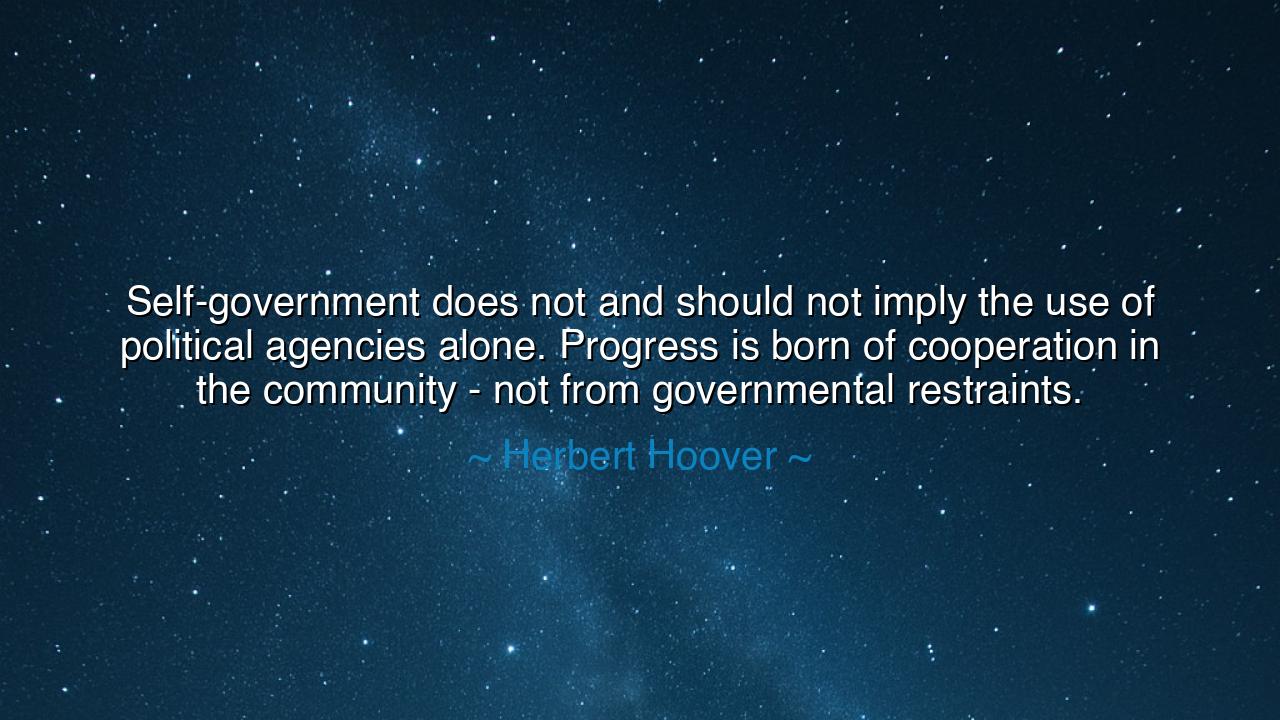
Self-government does not and should not imply the use of
Self-government does not and should not imply the use of political agencies alone. Progress is born of cooperation in the community - not from governmental restraints.






When the storms of uncertainty shook the world between wars, Herbert Hoover—a man of science, of service, and of deep moral conviction—spoke these words: “Self-government does not and should not imply the use of political agencies alone. Progress is born of cooperation in the community—not from governmental restraints.” In these words lies a philosophy of freedom, both ancient and ever-new: that the true strength of a nation does not reside in its laws, but in the virtue and cooperation of its people. Hoover’s vision was not that of an empire ruled from the top, but of a living organism—each citizen a vital cell, bound to the others by goodwill and shared purpose.
This quote arose from Hoover’s deep belief in what he called the “American system”—a social order where liberty and responsibility walk hand in hand. Having witnessed the devastation of war and the excesses of centralized power, he saw that a government could protect liberty, but never create it; it could organize action, but never inspire it. True progress, he said, springs from community spirit, from neighbors lifting one another, from voluntary cooperation rooted in conscience, not compulsion. Where people rely only on the state, the soul of society begins to weaken. But where they rely on one another, it grows strong and unbreakable.
To understand these words, recall the time when Hoover, before he became President, led a mighty act of mercy during World War I. Millions in Belgium faced starvation. Governments were paralyzed by fear and politics. Hoover, a private citizen then, built an international network of volunteers, farmers, and merchants, feeding the hungry not through decree, but through cooperation. Ships sailed not by orders of kings, but by the compassion of men. This was his creed in action: that human progress depends not on restraint, but on initiative—on the will of ordinary souls who choose to do what is right without waiting for authority to command them.
Such a principle echoes through the ages. When Athens first birthed democracy, it was not because of bureaucracy, but because citizens took upon themselves the sacred duty to govern their own conduct. When the early Christians built hospitals, orphanages, and schools, they did so not under imperial direction, but from the burning impulse of love. And when communities rebuilt after disaster, it was not the hand of government alone, but the joined hands of neighbors that restored life. Hoover’s words remind us that self-government is not a system of ballots and offices alone—it is a spiritual discipline, the daily art of ruling one’s self before seeking to rule others.
Yet Hoover was not blind to the need for law. He knew that order must exist, that justice must be upheld. But he warned that governmental restraint, when stretched too far, strangles the heart of human initiative. A nation that expects all things from its rulers becomes a nation of servants, not citizens. Freedom requires a balance—a framework of law that guards liberty, but leaves room for the creative power of voluntary action. Only then can progress be not merely mechanical, but moral; not decreed, but born.
This teaching calls us to awaken the spirit of civic cooperation within our own hearts. Each home, each school, each place of work can become a workshop of progress. When we organize not out of fear but out of hope, when we build not for reward but for the good of all, we honor the truest form of self-government. The farmer who teaches his neighbor, the worker who forms a union of fairness, the youth who leads a charity—each is a guardian of liberty more powerful than any law.
The lesson is clear and timeless: Do not wait for the state to make you noble. Build your own virtue. Do not depend on power to make you free. Freedom begins with the will to serve, to cooperate, to uplift. For in the end, no government can legislate compassion, no law can command love, and no empire can sustain itself if its people have forgotten how to act from the heart. Let your hands become instruments of progress, your spirit a light to your community—and the nation will rise, not through restraint, but through the boundless strength of its people.






AAdministratorAdministrator
Welcome, honored guests. Please leave a comment, we will respond soon